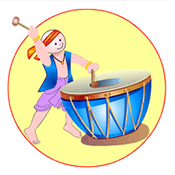
Dimdima
Online Children's Magazine from India

Dimdima
Online Children's Magazine from India
| Saga of Indian Revolutionaries |
|
|
The year 1924 witnessed the great train robbery at Kakori, an obscure village
near Lucknow. Pandit Ramprasad Bismil, Ashfaqulla, Roshan Singh and Rajendra
Lahiri were caught and hanged. Chandra Shekhar Azad, the youngest of the group
managed to elude the British and later together with Bhagat Singh formed the
Hindustan Socialist Republican Association (army). In 1928 HSRA made headlines
when in a daring attack master-minded by Azad, Bhagat Singh and Sukhdev shot
dead Saunders, a police official involved in the lathi charge on Lala Lajpat Rai.
In April 1929 Bhagat Singh and B. K. Dutta threw a bomb in the Central
Legislative Assembly in protest against the passage of the Public Safety Bill
and the Trade Disputes Bill. The two revolutionaries could have escaped in the
confusion that followed. But they waited to be arrested so that the attention of
their countrymen would be drawn to the freedom struggle through their trial. In
the statement read out at their trial the two revolutionaries stated that they
did not throw the bomb to kill but 'to make the deaf hear'.
On 23rd March 1931 Bhagat Singh, Sukhdev and Rajguru were martyred at the
gallows. Their countrymen wept and fasted on that day.
In Allahabad, Chandrasekhar Azad fought a pitched battle with the police in
Alfred Park and with his last bullet, shot himself. Kamala Nehru got Azad's body
released and arranged for the funeral. The tree near which Azad ended his life
became a place of pilgrimage till it was felled by the police.
Revolutionaries in Bengal under the leadership of Surya Sen raided the armories
in Chittagong in 1930. Surya Sen, affectionately called Masterda fought many
battles before he was arrested and hanged in 1934.
The revolutionary movement threw up many women revolutionaries. Pritilata
Waddedar died fighting. Kalpana Dutt Joshi was given a life sentence. Bina Das
took everybody by surprise in 1932 when she fired at the Governor while
receiving her degree at the Calcutta university convocation.
Rash Behari Bose who masterminded many daring missions undertaken by
revolutionaries had to flee the country and made Japan his home, leaving behind
an able and worthy successor in Subhas Chandra Bose whose destiny it was to lead
the final assault on the British.
Dimdima is the Sanskrit word for ‘drumbeat’. In olden days, victory in battle was heralded by the beat of drums or any important news to be conveyed to the people used to be accompanied with drumbeats.
Bharatiya Vidya Bhavan
K. M Munshi Marg,
Chowpatty, Mumbai - 400 007
email : editor@dimdima.com
Bharatiya Vidya Bhavan
505, Sane Guruji Marg,
Tardeo, Mumbai - 400 034
email : promo@dimdima.com
Dimdima.com, the Children's Website of Bharatiya Vidya Bhavan launched in 2000 and came out with a Printed version of Dimdima Magazine in 2004. At present the Printed Version have more than 35,000 subscribers from India and Abroad.